The Rise of Sustainable Fashion: A Closer Look at Ethical Choices
As the fashion industry continues to evolve, there has been a noticeable shift towards sustainability and ethical choices. The rise of sustainable fashion has brought about a transformation in the way we view style and the impact of our clothing choices. Ethical considerations such as the use of eco-friendly materials, fair labor practices, and the reduction of carbon footprint are now at the forefront of the fashion world.
Consumers are becoming more conscientious about the environmental and social implications of their clothing purchases, leading to a greater demand for sustainable and ethically-made garments. This has prompted many fashion brands to reevaluate their production processes and embrace eco-friendly alternatives. From organic cotton and bamboo fabric to recycled materials and innovative technologies, the options for sustainable fashion have expanded significantly.
Furthermore, the rise of sustainable fashion has seen the emergence of ethical certifications and labeling, providing consumers with transparent information about the ethical and environmental standards followed by brands. This has empowered individuals to make more informed choices, supporting the growth of a sustainable fashion movement that values responsibility and ethics alongside style.
Ultimately, the rise of sustainable fashion is reshaping the industry, encouraging a fundamental redefinition of style that prioritizes ethical choices and environmental sustainability. This shift not only reflects changing consumer attitudes but also paves the way for a fashion landscape that is conscious, considerate, and committed to making a positive impact.
Eco-Friendly Fabrics: Paving the Way for Sustainable Style
Sustainable fashion is not only about the design and style of clothing, but also about the materials used in the production process. Eco-friendly fabrics are paving the way for sustainable style, offering a more ethical and environmentally conscious choice for fashion lovers. These fabrics, such as organic cotton, hemp, bamboo, and recycled polyester, are produced with minimal impact on the environment and often promote fair labor practices.
Organic cotton, for example, is grown without the use of harmful pesticides and chemical fertilizers, reducing the environmental footprint of the fabric. Hemp is known for being a strong and durable material that requires minimal water and no pesticides to grow. Bamboo is a fast-growing plant that can be sustainably harvested for fabric production. Additionally, recycled polyester gives a new life to plastic bottles and other post-consumer waste, reducing the amount of plastic ending up in landfills or the ocean.
By opting for clothing made from eco-friendly fabrics, consumers can embrace sustainable fashion without compromising on style. These fabrics are not only better for the environment, but also feel great against the skin and offer versatile options for designers to create stylish and trendy pieces.
As the demand for sustainable fashion continues to grow, the use of eco-friendly fabrics is expected to play a vital role in redefining style with ethical choices. Fashion brands and consumers alike are recognizing the importance of embracing eco-friendly materials, and it’s clear that the future of fashion lies in sustainable and ethical practices.
Fashion Forward: Embracing Ethical Practices in the Industry
Sustainable fashion is not just a passing trend; it’s a movement that is reshaping the entire fashion industry. As consumers become more conscious of the environmental and ethical implications of their clothing choices, there is a growing demand for fashion brands to embrace ethical practices. This shift has paved the way for a new era of fashion forward thinking, where style and sustainability go hand in hand.
Embracing ethical practices in the fashion industry involves a fundamental rethinking of the entire supply chain. It starts with sourcing eco-friendly and sustainable materials, such as organic cotton, hemp, and recycled fabrics. These materials not only reduce the environmental impact of clothing production but also ensure that workers involved in the manufacturing process are not exposed to harmful chemicals.
Furthermore, ethical fashion means treating the garment workers with respect and providing them with fair wages and safe working conditions. Fashion forward brands are increasingly transparent about their manufacturing processes, allowing consumers to make informed choices about the clothes they buy.
Another crucial aspect of ethical fashion is minimizing waste. The concept of “fast fashion” has led to an alarming amount of textile waste, but sustainable fashion aims to counter this trend by promoting quality over quantity. By creating durable, timeless pieces and offering repair and recycling programs, brands can extend the lifespan of their products and reduce the burden on landfills.
In conclusion, the fashion industry is at a pivotal moment where ethical considerations are becoming integral to the very definition of style. By embracing sustainable and ethical practices, fashion forward brands are not just meeting the demands of the current market, but also contributing to a more responsible and eco-conscious future.
